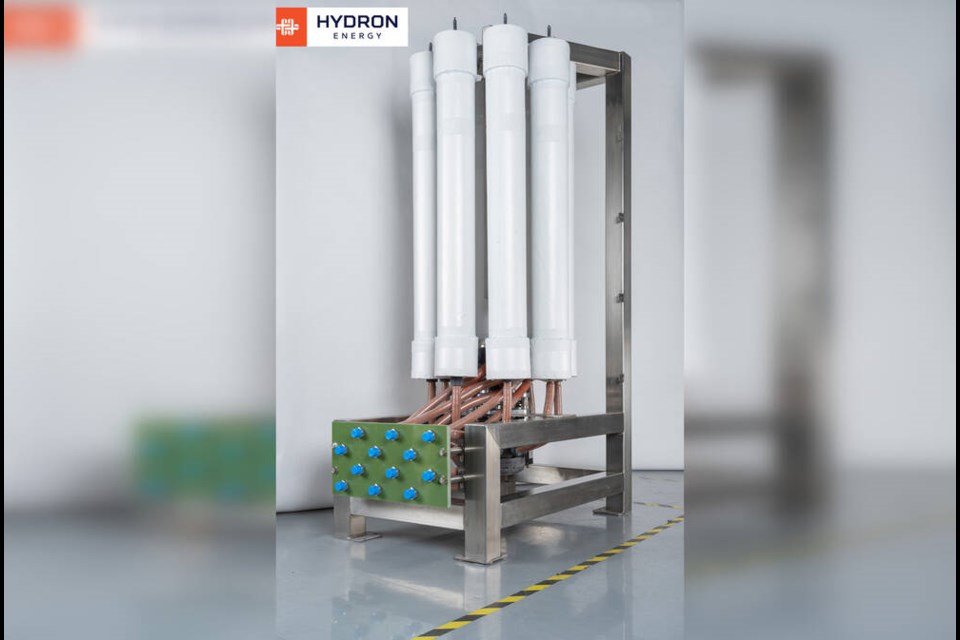A North Vancouver engineering firm may be poised to help take a big chunk out of the world’s greenhouse gas emissions.
Hydron Energy, which is based in Lynn Creek, has received a $365,000 grant from the Natural Gas Innovation Fund to launch technology that could help greatly speed up the transition away from fossil fuels by making more efficient use of biogas.
What is biogas?
Today, the vast majority of our carbon-based fuels come from oil and gas that has been sequestered underground for hundreds of millions of years. As we dig it up and burn it, the carbon is released into the atmosphere, trapping heat and warming the planet.
But, whether it is from food waste, industrial processes, or cow poop, there is plenty of biomass releasing carbon from a much shorter cycle, carbon that we could be capturing and putting to use with a fraction of the environmental impact.
Hydron CEO Soheil Khiavi compares the concept to putting a bottle into the recycling, rather than into the trash.
“Why we are not recycling the carbon from the energy that we are burning?” he asked. “That way the carbon that we release from the burning of natural gas is going to be the carbon that belongs to the same cycle so we are not bringing up the [dinosaur] skeletons and pulverizing them into the atmosphere.”
Biogas poised for growth
Every year, North Americans consume trillions of cubic feet of natural gas, only about five per cent of which is biogas. FortisС����Ƶ had a target to make biogas five per cent of their total inventory sold in 2021, but today, they are still at about one per cent, Khiavi said.
One of the biggest impediments to wider adoption has been the cost of refining the raw product, which contains impurities that make it unsafe for consumer use.
That’s where Hydron’s INTERUPTor comes in. Khiavi and his team have designed the first biogas upgrader that operates at atmospheric conditions without the need for high pressures or temperatures.
“The old processes are quite expensive and they’re very energy intensive and they already have a high carbon footprint,” he said. “You go to all this hard work to make this biofuel and then you waste half of it by using this old technology which has been developed for oil and gas refining.”
An INTERUPTor can do the same job as older technology for about half the cost, Khiavi said.
He described the machine’s process as “biomimicry,” operating similarly to how our lungs work.
“We looked at how nature removes carbon dioxide from our body as we exhale and we took that concept and turned it into an industrial version,” he said.
Khiavi said the company has received almost $3 million in grants from various sources to help move the technology from proof of concept to field testing and now to scaling up the technology for the market.
But who will buy it?
Much of the world’s strategy to transition away from carbon involves electrification of buildings and transportation, but about 20 to 25 per cent of total emissions come from “hard to decarbonize” sectors where there is no foreseeable changes in battery technology that will meet current demands – heavy equipment and trucking, mining and shipping.
Businesses in those industries are looking for low-carbon energy sources like biogas and hydrogen, which the INTERUPTor can also refine, Khiavi said.
They already have industrial clients lined up for purchases in the first quarter of 2024, he said.
If there’s a broader lesson, Khiavi said, it’s that not only is decarbonization possible and necessary, it can also be profitable too. That small segment of the energy market that uses biogas today is worth $50 billion, Khiavi said, and it’s only going to grow.
“I heard in the past people saying that there’s no technology, there’s no product. ‘If you want to do this, you’re going to wreck the economy.’ Well, this is where I can come to play,” he said. “I will make this actually into an opportunity for business rather than a failure of business, so there’s no more excuses left.”
Hydron isn’t Khiavi’s first foray into decarbonization. After starting his career working as an engineer in oil and gas refineries, he faced the realization he was “destroying nature,” he said. He went on to be one of the co-founders of Svante, a firm that found early success in carbon capture technology “to put it back underground where it belongs,” Khiavi said. When he founded Hydron in North Vancouver in 2020, Khiavi brought the same team of engineers with him to work on the INTERUPTor.
“It’s important because we’ve got one planet. It is called Earth,” he said. “We have to take care of it and not destroy it.”




